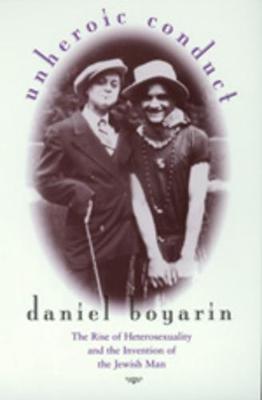Contraversions: Critical Studies in Jewish Literature, Culture, and Society
2 primary works
Book 1
Daniel Boyarin turns to the Epistles of Paul as the spiritual autobiography of a first-century Jewish cultural critic. What led Paul - in his dramatic conversion to Christianity - to such a radical critique of Jewish culture? Paul's famous formulation, 'There is neither Jew nor Greek, no male and female in Christ', demonstrates the genius of Christianity: its concern for all people. The genius of Judaism is its validation of genealogy and cultural, ethnic difference. But the evils of these two thought systems are the obverse of their geniuses: Christianity has threatened to coerce universality, while ethnic difference is one of the most troubled issues in modern history.Boyarin posits a 'diaspora identity' as a way to negotiate the pitfalls inherent in either position. Jewishness disrupts categories of identity because it is not national, genealogical, or even religious, but all of these, in dialectical tension with one another. It is analogous with gender: gender identity makes us different in some ways but not in others.
An exploration of these tensions in the Pauline corpus, argues Boyarin, will lead us to a richer appreciation of our own cultural quandaries as male and female, gay and straight, Jew and Palestinian - and as human beings.
An exploration of these tensions in the Pauline corpus, argues Boyarin, will lead us to a richer appreciation of our own cultural quandaries as male and female, gay and straight, Jew and Palestinian - and as human beings.
Book 8
In a book that will both enlighten and provoke, Daniel Boyarin offers an alternative to the prevailing Euro-American warrior/patriarch model of masculinity and recovers the Jewish ideal of the gentle, receptive male. The Western notion of the aggressive, sexually dominant male and the passive female reaches back through Freud to Roman times, but as Boyarin makes clear, such gender roles are not universal. Analyzing ancient and modern texts, he reveals early rabbis - studious, family-oriented - as exemplars of manhood and the prime objects of female desire in traditional Jewish society. Challenging those who view the 'feminized Jew' as a pathological product of the Diaspora or a figment of anti-Semitic imagination, Boyarin argues that the Diaspora produced valuable alternatives to the dominant cultures' overriding gender norms. He finds the origins of the rabbinic model of masculinity in the Talmud, and though unrelentingly critical of rabbinic society's oppressive aspects, he shows how it could provide greater happiness for women than the passive gentility required by bourgeois European standards.
Boyarin also analyzes the self-transformation of three iconic Viennese modern Jews: Sigmund Freud, the father of psychoanalysis; Theodor Herzl, the founder of Zionism; and Bertha Pappenheim (Anna O.), the first psychoanalytic patient and founder of Jewish feminism in Germany. Pappenheim is Boyarin's hero: it is she who provides him with a model for a militant feminist, anti-homophobic transformation of Orthodox Jewish society today. Like his groundbreaking "Carnal Israel", this book is talmudic scholarship in a whole new light, with a vitality that will command attention from readers in feminist studies, history of sexuality, Jewish culture, and the history of psychoanalysis.
Boyarin also analyzes the self-transformation of three iconic Viennese modern Jews: Sigmund Freud, the father of psychoanalysis; Theodor Herzl, the founder of Zionism; and Bertha Pappenheim (Anna O.), the first psychoanalytic patient and founder of Jewish feminism in Germany. Pappenheim is Boyarin's hero: it is she who provides him with a model for a militant feminist, anti-homophobic transformation of Orthodox Jewish society today. Like his groundbreaking "Carnal Israel", this book is talmudic scholarship in a whole new light, with a vitality that will command attention from readers in feminist studies, history of sexuality, Jewish culture, and the history of psychoanalysis.

